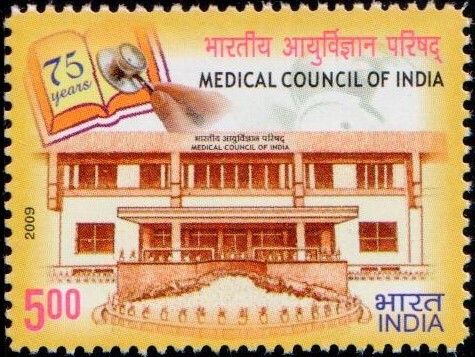
Medical Council of India
A commemorative postage stamp on the Platinum Jubilee (1933-2008) of the Medical Council of India (MCI), an Indian regulatory body :

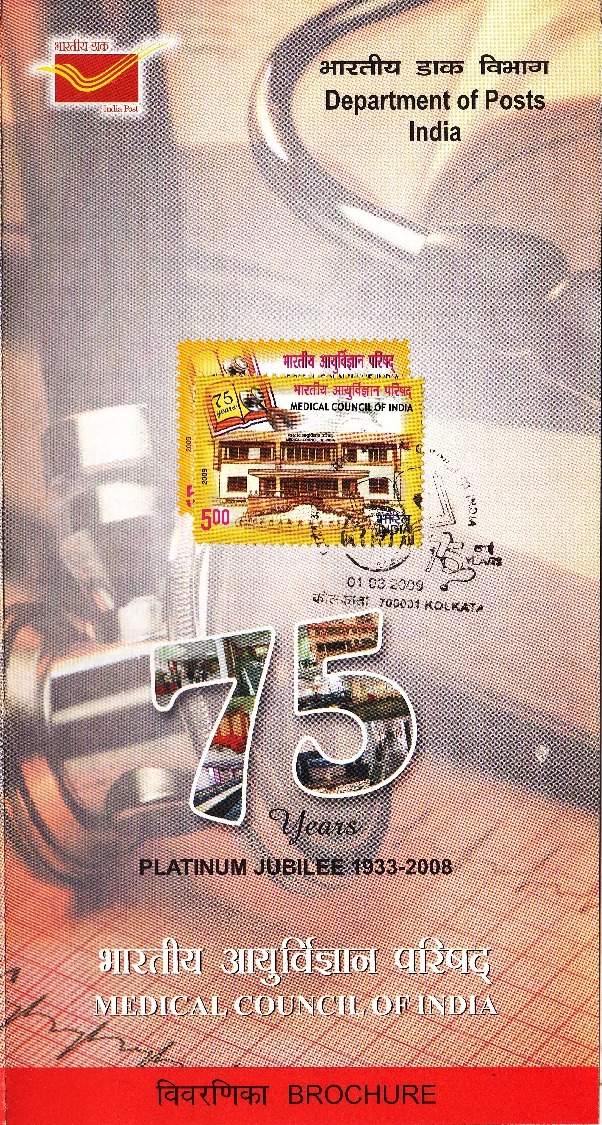 Issued by India
Issued by India
Issued on Mar 1, 2009
Issued for : India Post is proud to commemorate the Platinum Jubilee of the Medical Council of India on completion of 75 years since its inceptions in 1934, with the issue of Postage Stamp on ‘Medical Council of India’.
Credits :
Stamp & FDC : Brahm Prakash
Cancellation : Alka Sharma
Type : Stamp, Information Brochure with first day cancellation
Colour : Multi Colour
Denomination : 500 Paise
Stamps Printed : 0.4 Million
Printing Process : Wet–Offset
Printer : India Security Press, Nasik
About :
- The Medical Council of India established in the year 1934 under the Indian Medical Council Act, 1933, with the primary objective of establishing uniform standards of higher qualifications in modern medicine and their recognition in India and abroad.
- The number of medical colleges increased steadily during the post-independence years. Resultantly, it was felt that the provisions of Indian Medical Council Act were inadequate to cope up the ‘challenges’ posed by rapid developmental progress of the medical education in the country. As such, in the year 1956 the earlier Act was repealed and a new one was enacted. This subsequently was modified in the year 1964, 1993 and 2001 respectively by the Indian Parliament.
- The objectives of the council as enshrined in the Indian Medical Council Act pertain to maintenance of uniform standards of Undergraduate and Postgraduate medical education, making of recommendations for permission to start new undergraduate and postgraduate course and/or increase in capacity/recognition/de-recognition of medical qualifications of medical institutions of India or foreign countries, granting permanent registration/provisional registration of doctors with recognised medical qualifications, evolving reciprocity with foreign countries in the matter of mutual recognition of medical qualifications, ensuring implementation of Indian Medical Council (Professional Conduct, Etiquette and Ethics) Regulations, working out updation and upgradation of curriculum of various undergraduate, and postgraduate courses in vogue and prescribing and regulating Minimum Standard Requirements of teaching faculty, clinical material and infrastructure required in medical colleges commensurate with desired standards of medical education.
- Towards fulfilment of these enshrined ‘Objectives’, the Council is duty boundedly required to carry out Inspection/visitation with a view to ensure maintenance of proper standards of medical education in India, grant of permission to start new medical colleges or new Courses including Post Graduates or Higher Courses, increase of seats, renewal of permissions; Award/recognition/de-recognition of Indian and foreign qualifications, ensuring registration of doctors having primary medical qualifications particularly from abroad and additional medical qualification along with issuance of Good Standing Certificates for doctors going abroad. It is also required to maintain All India Medical Register of persons who hold any of the recognized medical qualification or for the time being registered with any of the State Medical Councils or Medical Council of India including ensuring effective and meaningful implementation of Professional Code of Conduct Regulations and also to act as an appellate authority over decisions taken by State Medical Councils in the country.
- The Medical Council of India came to be headed by the grand son of Mother India late Dr. Bidhan Chandra Roy as its first Indian President who was not only a very eminent politician, but was also the tallest stalwart of the medical profession. Since the inception, its march towards fulfilment of its targeted objectives has been incessant and of consequence to all its stakeholders.
- In terms of the powers vested with the Medical Council of India for prescribing a subordinate legislations’ in order to effectively fulfil the objectives that stand entrusted to it, Medical Council of India has notified important Regulations under section 33 of the Indian Medical Council Act, 1956 from time to time namely Graduate Medical Education Regulations, Postgraduate Medical Education Regulations, Minimum Standard Requirements for 50/100/150 MBBS Admissions, Annually Regulations and Minimum Qualifications for Teachers in Medical Colleges Regulations, which are updated periodically to make them ‘timely’, ‘purposive’ and ‘relevant’.
- 75 glorious years stand added to Medical Council of India, ever since its inception by the Parliamentary enactment in the year 1934, whereby it has emerged as the statutory ‘custodian’ of the standards of medical education in the country, ensuring generation of trained health manpower commensurate with the ‘National needs’. But for this dispensation emergence of efficient and effective health care delivery system in India would not have been possible. It is by virtue of generation of the desired health care delivery system that the concept of “Welfare State” as incorporated in the Constitution of India stands actualized in a big way. It has served the larger public interests, as a result of which the prints of its functional impact generated in the last 75 glorious years are unerasable.
- Text : Based on materials provided by the proponent.




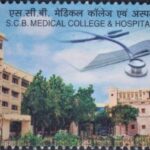

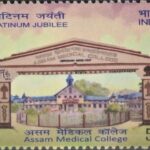
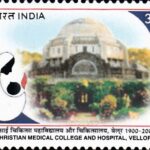
[…] during those times. The first batch of 22 MBBS students joined in 1944 and passed in 1948, and MCI recognised the course in 1952 with retrospective effect. Post graduate courses, MD/MS was started […]
[…] is recognized for many a path breaking research. The institution has a unique recognition by both Medical Council of India and University Grants Commission as an independent post graduate hospital affiliated to University […]
[…] 8 (eight) super speciality departments. Whereas post graduate courses were recognized by the then MCI during the 1960s itself, the NMC has also given the green signal to DM and MCh courses in 3 (three) […]